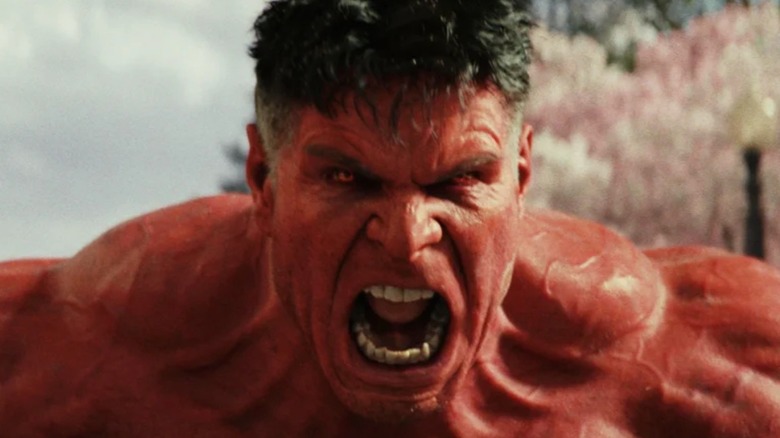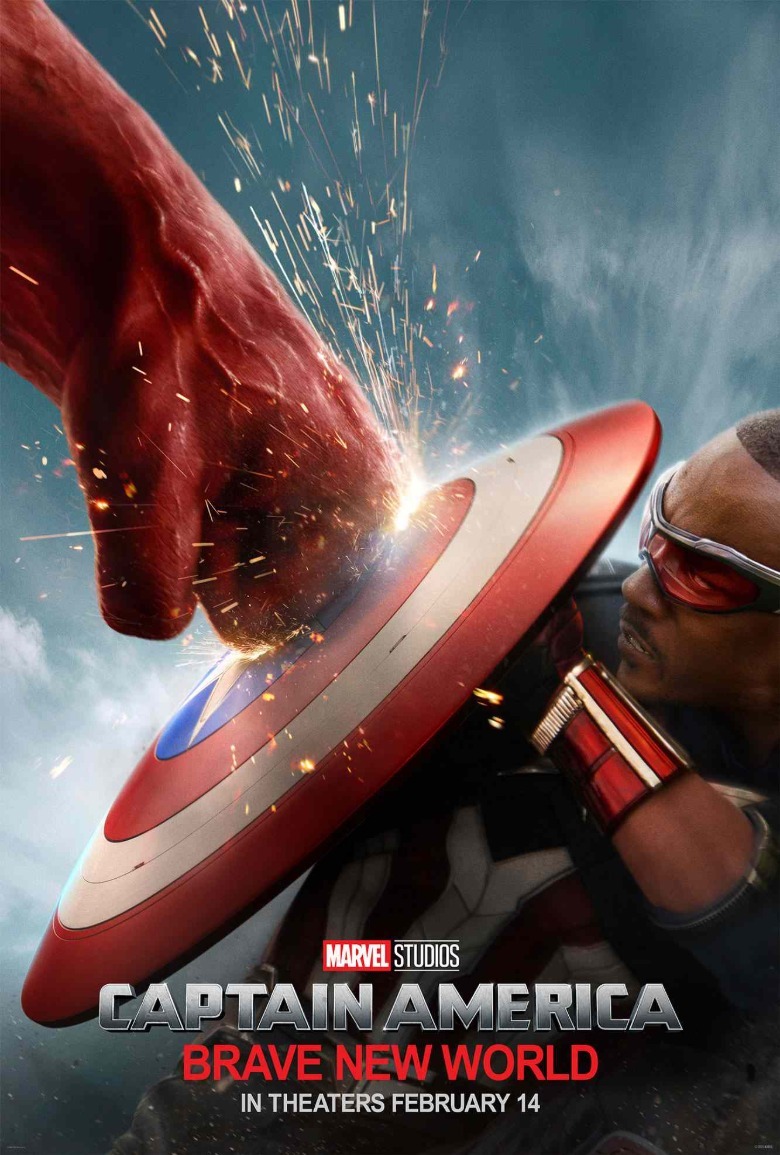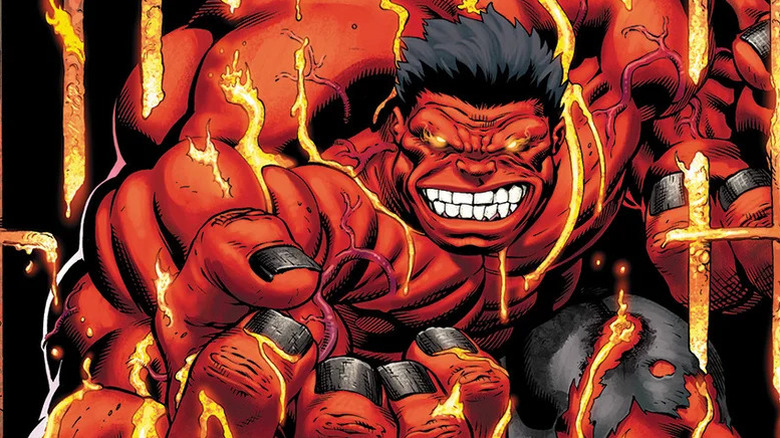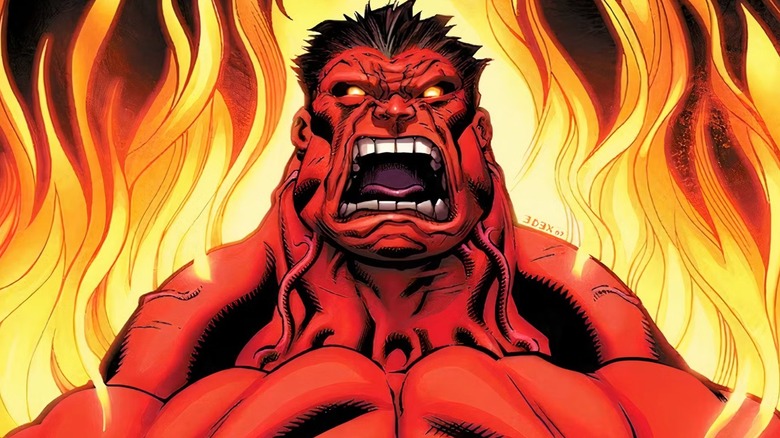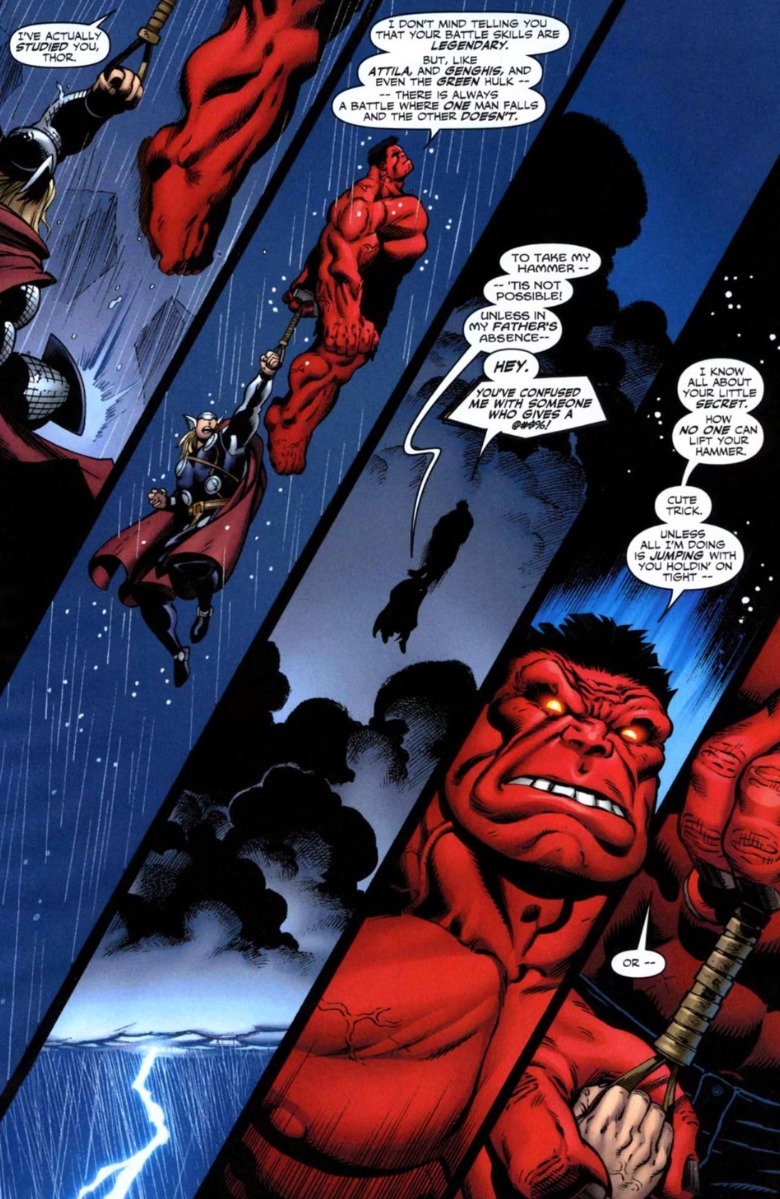Before Captain America: Brave New World, Red Hulk Was One Of Marvel's Worst Characters
Spoilers for "Captain America: Brave New World" follow.
I'm not the first critic to say "Captain America: Brave New World" feels more like a Hulk-less Hulk movie. Well, actually, not quite Hulk-less because this picture has got a Red Hulk. That's right, thanks to the diabolical Leader (Tim Blake Nelson in a too-overdue reprisal from "The Incredible Hulk"), President Thaddeus Ross becomes the Red Hulk. Formerly played by the late William Hurt, Ross now wears the face of Harrison Ford, joining the Marvel universe to ride the superhero movie wave.
Indeed, the marketing for "Brave New World" has progressively leaned less on the draw of Ford himself and more on the sight of his Hulked-out self fighting Captain America (Anthony Mackie).
But should Marvel fans be geeking out about this? More power to you if you are, but I've been dreading this film in part because of the Red Hulk. He has never been a good character, and Marvel's pushing of him the past two decades — culminating in him starring in a blockbuster — has always struck me as odd and unmerited.
Marvel Cinematic Universe fans have a habit (absolutely abetted by marketing and the fan hype industrial complex) of heralding every new MCU film as the adaptation of a vaunted story or characters. Claiming that about the Red Hulk? Laughable. Just because it happened in the comics, that doesn't make it good! Marvel Comics is littered with the remains of bad ideas; the ones that have endured are the best ones and it used to be that only they made it off the funny pages and onto the silver screen.
The original Red Hulk storyline is a low point for Hulk comics
The Red Hulk debuted in 2008, created by writer Jeph Loeb and Ed McGuinness in their ultimately 24-issue run on "Hulk." The comic was a bestseller, no doubt helped by the long-lasting mystery of who the Red Hulk was. Those sales numbers probably helped ease the Red Hulk from a potential one-off into Marvel's enduring stable, but we'll see if the Red Hulk can boost "Brave New World" at the box office when all the surprise has been stripped away.
Loeb loves his superhero murder mysteries, from "Batman: The Long Halloween" to "Ultimates 3," and he falls back on that here. In "Hulk" #1, long-time super-villain Emil Blonsky/the Abomination is found murdered and the Red Hulk soon reveals himself as the killer. The real mystery becomes who this Red Hulk is, which drags on until #22 until he finally turns back into Ross on-panel.
Now, this answer hangs together well enough — in earlier issues during the Red Hulk's inner monologue, he speaks like a military man ("understanding your allies is as important as knowing your enemies") and fixates on his hatred for Bruce Banner. He even calls Banner a "milksop," Ross' go-to insult for his daughter's egghead boyfriend since "Incredible Hulk" #1. The Abomination had previously murdered Ross' daughter Betty, so after that, he had the motive to kill Blonsky. As for scenes where Red Hulk and Ross were seen together? Those times, "Ross" was merely a life model decoy (or an android stand-in).
But while the answer makes sense, is it satisfying? And does being the Red Hulk improve Ross' character? I'd argue it only diminishes him, by making him into just another Hulk iteration. It's also not a satisfying mystery because the comic only has the barest pretensions of being one. In practice, "Hulk" is more of a dumb schlocky beat-em-up; McGuinness' art, with his muscular character designs and splash pages, at least works for the latter. But if you aren't sold on the Red Hulk's character, reading the comic will be insufferable — because "Hulk" loves its new lead.
The Red Hulk is a character flawed from conception
Now, the Red Hulk lasted beyond Loeb's tenure and so other writers have gotten the chance to use him. Jeff Parker's subsequent "Hulk" issues have been called an improvement, for instance. But the rot is foundational.
The Red Hulk is a character a 10-year-old would imagine. The Hulk... but red (and that's all his design is too). But also, he's even stronger! And he controls fire when he gets angrier and angrier! And also he's smart! With a super-gun! The very name "Red Hulk" (not to mention the ludicrous nickname, "Rulk") shows what a lazy character he is.
A writer as accomplished as Loeb should've swept the idea to the back of his head but instead become convinced he'd struck gold. So, his "Hulk" run (especially the first six issues) keeps reminding you how totally awesome the Red Hulk is. In "Hulk" #5, the Red Hulk even defeats Thor by lifting his enchanted hammer Mjolnir.
Now, I find power scaling — debating which fictional character is stronger — to be dull. It's a puerile conversation that can never be wholly answered because these people aren't real. So while I do find Red Hulk defeating Thor ludicrous, I'm not going to criticize it solely for narrative rule-breaking (that being Mjolnir is magically enchanted so only those "Worthy" can wield it — Ross hardly qualifies as a hero worthy of Thor.)
No, let's ask why Loeb wrote his story this way. He's employing a classic wrestling move; have the new guy beat the old favorite to show how cool the new guy is. In superhero comics, this usually happens as a new villain coming in and replacing the old bad guy, i.e. Red Hulk supplanting the Abomination, who had historically been the "evil, smart Hulk" villain.
Loeb was so proud of the Red Hulk that he became the book's protagonist halfway through, while "Hulk" #15 featured Betty Ross returning as a Red She-Hulk. (Fingers crossed they don't make Liv Tyler do that in the MCU.)
Harrison Ford playing "Thunderbolt" Ross as the President is fine casting, and a fun throwback when he played a different president in "Air Force One." But turning Ross into the Red Hulk, an already ridiculous character, sullies him and is beneath the dignity that a living Hollywood legend like Ford deserves.
"Captain America: Brave New World" is now playing in theaters.
